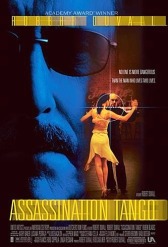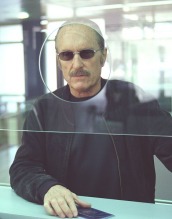|
Assassination Tango
|
| |
 |
USA, 2002. Rated R. 114 minutes.
Cast:
Robert Duvall, Luciana Pedraza, Rubén Blades, Kathy Baker, Julio Oscar
Mechoso, James Keane, Frank Gio, Katherine Micheaux Miller, Frank Cassavetes,
Michael Corrente, Raúl Outeda, Géraldine Rojas
Writer: Robert Duvall
Music: Luis Enríquez Bacalov and various artists
Cinematographer: Felix Monti
Producers: Rob Carliner, Robert Duvall
Director: Robert Duvall
LINKS
|
 obert
Duvall loves the tango. Robert Duvall loves Argentina. Robert Duvall loves longtime
girlfriend Luciana Pedraza, with whom he performed the tango at the White House
in 1999. Robert Duvall loves movies about the mob--or he's made a lot of them,
anyway. Robert Duvall loves complex characters full of internal contradictions,
if The Apostle is any indication. Put all of these things together, and
you get Assassination Tango, a stew of ideas that struggles to find meaning
in its lengthy character study. There's many flavors, but not much beef. What
the heck, throw in another dream dance sequence!
obert
Duvall loves the tango. Robert Duvall loves Argentina. Robert Duvall loves longtime
girlfriend Luciana Pedraza, with whom he performed the tango at the White House
in 1999. Robert Duvall loves movies about the mob--or he's made a lot of them,
anyway. Robert Duvall loves complex characters full of internal contradictions,
if The Apostle is any indication. Put all of these things together, and
you get Assassination Tango, a stew of ideas that struggles to find meaning
in its lengthy character study. There's many flavors, but not much beef. What
the heck, throw in another dream dance sequence!
The story is this: Duvall's grizzled assassin John J. doesn't have much in
life beyond girlfriend Maggie (Kathy Baker) and Maggie's young daughter Jenny
(Katherine Micheaux Miller), whom John adores. His ugly world of bottom feeders
is the mob of Goodfellas,
not of The Godfather, and he finds refuge from it with Maggie and Jenny
and a passion for the tango. After he's sent on a job to Argentina that is delayed
by unforeseen complications, John discovers a type of tango he's never seen
before, danced with sexual, passionate precision. He fixates on professional
tango dancer Manuela (Pedraza), who is inexplicably indulgent of his efforts
to insinuate himself into her life. They never become explicitly romantic, but
romance is hinted. Regarding their extreme age difference, Manuela shrugs imperceptibly
and says, "This is Argentina." I guess we're supposed to accept this because
Pedraza and Duvall are together in real life.
Despite his improbable relationship with Manuela, John's scenes with the women
are the best part of the movie. Duvall shares an easy rapport with Baker, who
plays a loose, relaxed character for a change, and a quiet chemistry with Pedraza.
It's the indistinct crime story that fails to engage. John has none of the sophistication
and grace that the movies like to associate with professional assassins.  Unlike
a cunning veteran killer as Chow Yun-Fat or Jean Reno might portray, John ruthlessly
goes for the target, perhaps having arranged for a concurrent distraction, and
exits the scene as rapidly as possible. Why does the local boss consider him
to be "the best"? Presumably because John gets the job done, nothing more complicated
than that.
Unlike
a cunning veteran killer as Chow Yun-Fat or Jean Reno might portray, John ruthlessly
goes for the target, perhaps having arranged for a concurrent distraction, and
exits the scene as rapidly as possible. Why does the local boss consider him
to be "the best"? Presumably because John gets the job done, nothing more complicated
than that.
In Argentina, John is supposed to kill a general guilty of many of the politically
motivated "disappearances" of the 1970s. Or so he is told by his contacts, the
family members of one of the disappeared--or something, it's not really clear--who
include Miguel (Rubén Blades). There's another guy through whom John was hired,
or something, and he has a guy inside the federal police that will help John
exit the country afterward, or something, and then some of these guys start
following John around, providing some justification for John's paranoia. Or
something. Why these people would bother bringing John all the way to Argentina
(he is a nobody to them) only to doublecross him is beyond comprehension, but
it's not really the point of the film, which is just as anxious as John to return
to the dance parlor at every opportunity to watch Manuela. Pedraza is not a
lifelong dancer, having been introduced to the tango by Duvall himself, but
sure carries herself like one.
The link between the tango and killing is similarly unclear. Certainly the
beauty of the tango, at times fiery and other times coldly severe, presents
a sharp contrast to John's messy murders, underscoring the contradictions of
John's character. He is a killer, yet he is passionate about life. He is fiercely
loyal to his adopted family back home in New York, and has never been unfaithful
to them--at least if you don't count the occasional prostitute who calls him
"papito" (daddy) or his flirtations with Manuela. These tensions would be more
intriguing if John seemed more like a plausible person and less like an excuse
for Duvall to indulge in ACTING! As a result, the character study fails to engage.
Assassination Tango is a frustratingly vague film that won't make much
sense anywhere other than inside Duvall's head. It was executive producer Francis
Ford Coppola who suggested to his friend that he combine his love of tango with
his love of filmmaking. Unfortunately, the story doesn't seem to be thought
out much beyond that. The metaphor, if one is intended, doesn't work. Assassination
proves to be like the tango much in the same way a Subaru automobile is like
punk rock, or reality television is like reality. Assassination Tango
will find an audience among fans of dance or of Robert Duvall, or those who
confuse abstruseness with artistry, but it won't be a wide one.
Review
© March 2003 by AboutFilm.Com and the author.
Images © 2002 United Artists Films, Inc. All Rights Reserved.

 Unlike
a cunning veteran killer as Chow Yun-Fat or Jean Reno might portray, John ruthlessly
goes for the target, perhaps having arranged for a concurrent distraction, and
exits the scene as rapidly as possible. Why does the local boss consider him
to be "the best"? Presumably because John gets the job done, nothing more complicated
than that.
Unlike
a cunning veteran killer as Chow Yun-Fat or Jean Reno might portray, John ruthlessly
goes for the target, perhaps having arranged for a concurrent distraction, and
exits the scene as rapidly as possible. Why does the local boss consider him
to be "the best"? Presumably because John gets the job done, nothing more complicated
than that.
